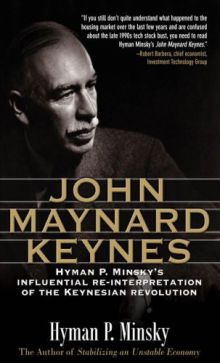Why we can’t avoid another financial crisis If there’s anything the last decade has shown us, it is that mainstream economists have gone astray in their tool shed. Mainstream neoclassical economics has contributed to causing today’s economic crisis rather than to solving it. So we are in dire need of rethinking economics. An important building block in working out a new — more realist and relevant — economic theory, is Hyman Minsky’s thoughts on the inherent instability of our financial economic system. In the spirit of Minsky, Steve Keen offers a radical challenge to mainstream economic theory in his latest book: The late Hyman Minsky described capitalism as an inherently unstable system. The Australian-born economist Steve Keen was a prominent follower of Minsky’s long before the global financial crisis made his unorthodox views fashionable. Thus, we can anticipate the answer to the question posed in the title of Keen’s new book, “Can We Avoid Another Financial Crisis?” A capitalist economy can no better avoid another financial crisis than a dog can avoid picking up fleas – it’s only a matter of time. And, if Keen is correct, we don’t have long to wait before the next blowup arrives.
Topics:
Lars Pålsson Syll considers the following as important: Economics
This could be interesting, too:
Lars Pålsson Syll writes Schuldenbremse bye bye
Lars Pålsson Syll writes What’s wrong with economics — a primer
Lars Pålsson Syll writes Krigskeynesianismens återkomst
Lars Pålsson Syll writes Finding Eigenvalues and Eigenvectors (student stuff)
Why we can’t avoid another financial crisis
If there’s anything the last decade has shown us, it is that mainstream economists have gone astray in their tool shed. Mainstream neoclassical economics has contributed to causing today’s economic crisis rather than to solving it.
So we are in dire need of rethinking economics. An important building block in working out a new — more realist and relevant — economic theory, is Hyman Minsky’s thoughts on the inherent instability of our financial economic system. In the spirit of Minsky, Steve Keen offers a radical challenge to mainstream economic theory in his latest book:
The late Hyman Minsky described capitalism as an inherently unstable system. The Australian-born economist Steve Keen was a prominent follower of Minsky’s long before the global financial crisis made his unorthodox views fashionable. Thus, we can anticipate the answer to the question posed in the title of Keen’s new book, “Can We Avoid Another Financial Crisis?” A capitalist economy can no better avoid another financial crisis than a dog can avoid picking up fleas – it’s only a matter of time. And, if Keen is correct, we don’t have long to wait before the next blowup arrives.
Mainstream economists notoriously failed to anticipate the subprime debacle … Why did Keen get it right when the grandees of his profession flunked? Institutional dominance appears to have placed the mainstream economists at an intellectual disadvantage. Long before they were blindsided by the Lehman Brothers bust, many in the economics elite had become a self-regarding bunch, worldly from a careerist perspective, eager to dominate policy discussions but cut off from the real world, inhabiting an echo chamber where only received opinions were entertained.
Last year, one of the clerisy broke ranks. In a withering speech, Paul Romer, the chief economist of the World Bank and a former New York University professor, accused his fellow macroeconomists of forming a monolithic intellectual community, which deferred to authority, disregarded the opinions of those outside of their group and ignored unwelcome facts. They behaved more like cult members than genuine scientists. Romer compared modern macroeconomics to string theory, famously described as “not even wrong.”
The preference for high theory and abstruse mathematical modeling meant that mainstream economics had come to rest on a number of gloriously improbable assumptions. In their models, millions of households were reduced to a single “representative agent,” a God-like being, omniscient and immortal. This unreal creature inhabited a world where peace – or equilibrium – ruled. Crises were impossible in such an Eden, unless a mischievous serpent entered from abroad. But such an outcome was naturally impossible to predict.
Both Romer and Keen agree that the most serious error of modern macroeconomics is that it ignores finance. Money is seen as a “veil” placed over the activities of the real economy, a mere contrivance to get around the inconveniences of barter. Minsky, by contrast, saw capitalism as a financial system in which millions of balance sheets and cash flows were intertwined in a highly complex fashion. Money and credit are the essence of capitalism: economic transactions can only take place after financing.
The trouble is that credit is inherently unstable, prone to expand excessively and to inflate asset price bubbles, which in time collapse, causing a cascade of defaults throughout the economy. In Minsky’s world, the tail of finance wags the real economy dog.
As a young research stipendiate in the U.S. yours truly had the great pleasure and privelege of having Hyman Minsky as teacher.
He was a great inspiration at the time.
He still is.
The concepts which it is usual to ignore or deemphasize in interpreting Keynes — the cyclical perspective, the relations between investment and finance, and uncertainty, are the keys to an understanding of the full significance of his contribution …
The conclusion to our argument is that the missing step in the standard Keynesian theory was the explicit consideration of capitalist finance within a cyclical and speculative context. Once captalist finance is introduced and the development of cash flows … during the various states of the economy is explicitly examined, then the full power of the revolutionary insights and the alternative frame of analysis that Keynes developed becomes evident …
The greatness of The General Theory was that Keynes visualized [the imperfections of the monetary-financial system] as systematic rather than accidental or perhaps incidental attributes of capitalism … Only a theory that was explicitly cyclical and overtly financial was capable of being useful …

